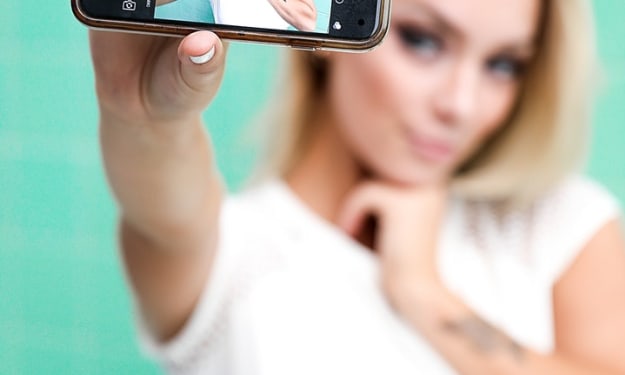The Best Apology Is Changed Behaviour
How To End Self-Sabotage

When we make a mistake in life, we tend to harbour that guilt and shame as self-loathing and constant fear of making the same mistakes again. It’s the old saying, "Forgive yourself first," that we hear over and over again when seeking for advice on how to move on after once again self-sabotaging our own happiness. We obsessively read positive quotes, wallow in our misery, and then find something to distract ourselves until we move on to make the same mistakes and end up in the same situation years, or even months, later. Sound familiar? This is the negative repetition that was my routine throughout my life until recently. How did I finally stop distracting myself from the pain and end the negativity that had resulted in copious amounts of failed relationships, and years of low self-esteem? The answer may sound cliché, and we’ve all heard it before, but learning to love yourself is your only option to get yourself out of the never-ending cycle of self-sabotage.
After years of both physically and mentally abusive relationships, not only with others, but also with myself, I finally found myself in a healthy and loving relationship. I finally took a breath of relief and began to relax into the idea that everything I wanted would now fall into place. Unfortunately, being riddled with years of anxiety and self-loathing, while I thought I was accepting finally being happy, I was actually ignoring all my old issues and placing an inordinate amount of pressure on my other half by asking for constant reassurance that the same problems that had come from years of unhealthy relationships would not repeat themselves with him. The man I was with began to pour all his energy into making me feel better and trying to take on my problems as his own — not that I even stopped to realise this at the time. Understandably, it became too much and both our hearts were broken in the process of him coming to a decision that I needed to take care of myself, away from our relationship.
I was devastated beyond recognition, and my heart felt as though it would literally explode at any minute. The thoughts of, "I ruined yet another thing in my life," "I’m unworthy of being loved," "I am unfixable," reigned control of my mind for days, and I couldn’t eat or sleep properly despite feeling it was impossible to move from my bed. After a week of continuously blaming myself and wondering how I would ever get through this pain, I thought through everything that had led to what happened and decided I needed to learn from this experience in order to ensure I never put my heart through this pain again. One morning, I decided to do a guided meditation from my favourite Youtube channel. I have been a fan of meditation as a way to control my anxiety for years now, but I knew I needed to find a guided meditation in order to have someone demand my thoughts stay focused while I couldn’t escape my own negativity. Halfway through this meditation, I heard the words, "The best apology is changed behaviour," run through my mind. I couldn’t understand in that moment exactly why, but I suddenly felt as if someone had handed me the key to a door I didn’t realise had been sitting unlocked in my mind forever. In order to stop blaming myself for the unfortunate events of my past, I had to forgive myself, and in order to do that, I needed to change the self-sabotaging behaviour that had led me to this place.
No matter how traumatic and harmful some of the behaviour I had experienced from others in my life, whether it be the severe bullying I received in my school years, or the abusive relationships I had experienced throughout my life, I had learnt years ago to always come to a place of forgiveness and understanding with those people in order to allow myself to move on without resentment or anger. One quality that I have proudly gained from traumatic experiences is that anger is the worst emotion to carry with you, and forgiving someone does not condone their actions at all, but it allows you to move on and not give those people the satisfaction of having you plaguing your thoughts — they’re simply not worth that space in your mind. Now, instead of carrying my blame and resentment towards the people who had wronged me in life, I realised instead of fully forgiving them, I had actually subconsciously shifted the blame from those events onto myself. I blamed myself and my behaviour for years of abuse, which had shattered my self-esteem in tiny fragments that I could barely see visible anymore. I had used self-harm, eating disorders, and self-criticism as a way of "coping" through pain, when really I was punishing myself for what others had done to me. If I wanted to forgive myself, I was going to have to change all the self-harm I believed I deserved into something positive and loving for my future.
It is a daily practice to reverse years of self-loathing, whether it be in the form of exercise, meditation, or any other self-care practice, but one small act a day could kick-start your road to recovery. It took me losing the person I believe is still my soulmate, to realise that just because you have found the right person, it doesn’t mean it is the right time. I’m still devastated, of course, but in order to receive love from others fully, you need to be feeding yourself the same compassion and love so that you don’t depend on that other person to provide all your self-esteem and worth — it’s not fair to expect that from anyone else, and it puts all of your pain into their hearts, which no one should want for someone they truly love. Only you can be responsible for your own happiness. It may just be a fun catchphrase on a great TV show, but as RuPaul would tell you — "If you can’t love yourself, how in the hell can you love somebody else?"
About the Creator
Anna Pembrey
Mental health and self-care warrior.






Comments
There are no comments for this story
Be the first to respond and start the conversation.